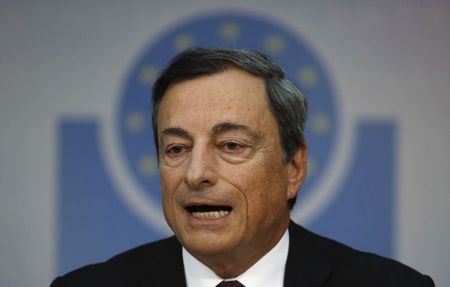FRANKFURT (Reuters) - European Central Bank President Mario Draghi expects the euro zone to grow modestly in the second half of the year, helped by the ECB's recent stimulus steps, and has pledged to do more should it become necessary.
In an interview published on Thursday by the Lithuanian business daily Verslo Zinios, Draghi warned that heightened geopolitical tensions could dampen business and consumer confidence. But he said sanctions imposed on and by Russia as a result of the Ukraine conflict had so far been limited in their impact on the euro zone economy.
Draghi also said there was a risk that insufficient structural reforms could weigh on the euro zone's business environment.
"According to the preliminary information received over the summer, economic conditions have been somewhat weaker than expected," Draghi was quoted as saying. "Overall, however, we expect modest growth in the second half of the year."
Growth in the euro zone economy ground to a halt in the second quarter and, with markets' belief in the ECB's ability to avert deflation diminishing, the bank launched new measures in June and September to boost growth, while urging governments to do their share of reforms.
"It is now in the hands of governments to act decisively on further structural reforms," Draghi said. "Governments should not unravel the progress made in fiscal consolidation, but use any leeway to make fiscal policies more growth-friendly."
He added that "unacceptably high unemployment" and continued weakness in credit growth were likely to curb the strength of the recovery.
To coax reluctant banks to lend again, the ECB has started offering them four-year loans at ultra-cheap rates. In October it will detail plans to buy securitised private debt, which aim to ease the burden on banks' balance sheets.
Draghi reiterated that the ECB was ready to do more if needed:
"We stand ready to use additional unconventional instruments within our mandate, and alter the size or composition of our unconventional interventions should it become necessary to further address risks of a too prolonged period of low inflation."
However, Draghi said the ECB did not expect to see Japanese-style deflation in the euro area.
"A number of factors differ distinctly from Japan in the 1990s," he said, noting that the ECB had intervened early on in the crisis, and was now also putting euro zone banks through a thorough health check to force them to tackle with lingering problems.

(Reporting by Eva Taylor; Editing by Kevin Liffey)
